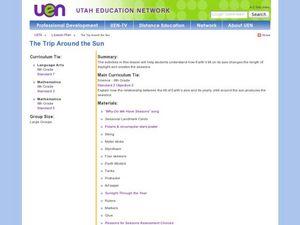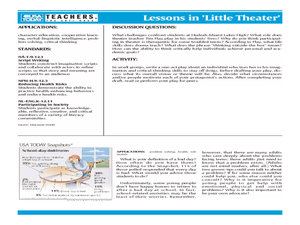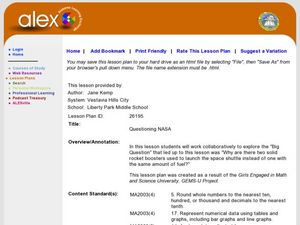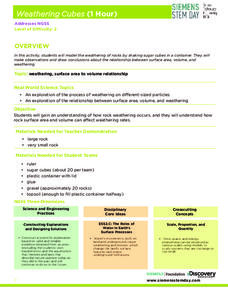Curated OER
Load! Ready! Fire!
Students will identify the parts of a cannon and practice demonstrating a mock firing. In this math and science lesson, students read background information on the cannon and its firing. Students read about and role play positions near...
Curated OER
The Trip Around the Sun
Sixth graders investigate the relationship between the tilt of the Earth's axis and the seasons. In this earth science lesson, 6th graders sing the song "Why Do We Have Seasons" and use simulate the Earth's tilt by using their bodies.
Curated OER
The Conservation Of Mass (The Mass Of Gas)
Students gain an understanding of matter in all of its phases. In this science lesson plan, students further their knowledge of the laws of conservation of mass, the loss in mass can be accounted for, when the gas is allowed to escape...
Curated OER
Lessons in 'Little Theater' Echo in Students' Lives
Students explore the drama of real life. For this journalism lesson, students read the USA Today article titled "Lessons in 'Little Theater' Echo in Students' Lives," respond to discussion questions regarding the article, and complete an...
Baylor College
About Air
Give your class a colorful and tasty representation of the components of the mixture that we call air. Pop a few batches of popcorn in four different colors, one to represent each gas: nitrogen, oxygen, argon, and carbon dioxide. The...
PBS
Surface Area and Volume
You and your class will like this lesson on using visual models to relate the volume and surface area of solid shapes. Learners construct three-dimensional forms using nets. They calculate the surface area and volume for each and then...
Teach Engineering
Exploring the Forces of Tension
Let the resource stretch the minds of your young scientists with a lesson plan about tensile strength and stiffness of materials. Groups consider how easily materials stretch and relate this property to engineering design.
NASA
Solar System Scale & Size
Use a variety of whole fruits to represent the different planets in the solar system to introduce scale sizes to your math or space science class. They follow suit by creating a non-scaled model of the solar system using specific-colored...
Curated OER
Kennedy Lesson Plan: Best Buddies
Students discuss disabilities. For this "Best Buddies" lesson, students take a look at programs that help people with disabilities and discover what role those people play in those programs. They work in pairs to explore the "Best...
Consumers Energy
The Cost of Electricity
How much is your toaster costing you every day? Young environmentalists calculate the monetary costs of household appliances based on their average consumption of wattage.
Curated OER
Questioning NASA
Space science and math collide in this inquiry that investigates launching times for antacid-tablet rockets! Upper elementary or middle school learners collect data as they launch these mini rockets. They apply concepts of place value...
Discovery Education
Fuss About Dust
Dust is everywhere around us; it's unavoidable. But what exactly is dust and are certain locations dustier than others? These are the questions students try to answer in an interesting scientific investigation. Working independently or...
Curated OER
Moon Mining
Go on a moon mining expedition from the safety of your classroom with this space exploration simulation. Using simple models of the moon's surface prepared ahead of time by the teacher, young scientists are challenged with locating and...
Science Matters
Peanut Energy
How do humans get energy since they aren't mechanical and can't photosynthesize? Learners explore this question by relating potential energy in food to human energy levels. Scholars measure the change in mass and a change in...
Education World
Predicting Pumpkins
If you want more pumpkin seeds, you should get a bigger pumpkin—right? Young harvesters use estimation skills to make a hypothesis about how many seeds they will find in a pumpkin before examining the real number inside.
Alabama Learning Exchange
Comparing Fuel Economy
Compute fuel economy and gas mileage. Why? So you can teach rates and ratios, of course! Middle schoolers calculate the rate of miles per gallon for various vehicles. They research each vehicle, its mileage per gallon, and cost per...
Chicago Botanic Garden
Climate Change Around the World
Look at climate change around the world using graphical representations and a hands-on learning simulation specified to particular cities around the world. Using an interactive website, young scientists follow the provided...
Alabama Learning Exchange
Dog Gone Again!
Here is a real-life lesson plan! Learners must plan the dimensions of a rectangular fence to reign in a runaway dog. They survey what shape and size fence is needed and use formulas to find perimeter and area of the fence. They explore...
Curated OER
Take a Stab!
Your geology class practices taking core samples of a potato to examine the stratigraphy. This is a terrific modeling lesson that helps youngsters visualize strata that cannot be seen from the surface of the ground. The directions...
Alabama Learning Exchange
Polygons-Changing Area Versus Changing Perimeter
Investigate the area and perimeter of polygons in this geometry lesson. Young geometers use grid paper to draw a quadrilateral and calculate its area and perimeter. They also read The Greedy Triangle to identify the changing shape of...
Alabama Learning Exchange
Human Slope
Middle and high schoolers explore the concept of slope. In this slope lesson, learners graph lines using a life-size graph. They use chalk on a blacktop to create a coordinate plane and use each other as the tick marks on the grid....
Computer Science Unplugged
Lightest and Heaviest—Sorting Algorithms
How do computers sort data lists? Using eight unknown weights and a balance scale, groups determine the order of the weights from lightest to heaviest. A second worksheet provides the groups with other methods to order the weights. The...
Beyond Benign
Ecological Footprint
How does your lifestyle measure up in terms of your ecological footprint? Young ecologists examine their impact on the planet using an insightful online calculator. A short quiz asks users to rank the size of their homes, their energy...
Discovery Education
Weathering Cubes
Weathering is not necessarily a result of the weather. Scholars conduct an experiment to explore the effect of surface area and volume on the weathering process. They create their own sugar cube rocks using the same number of cubes—but...






















